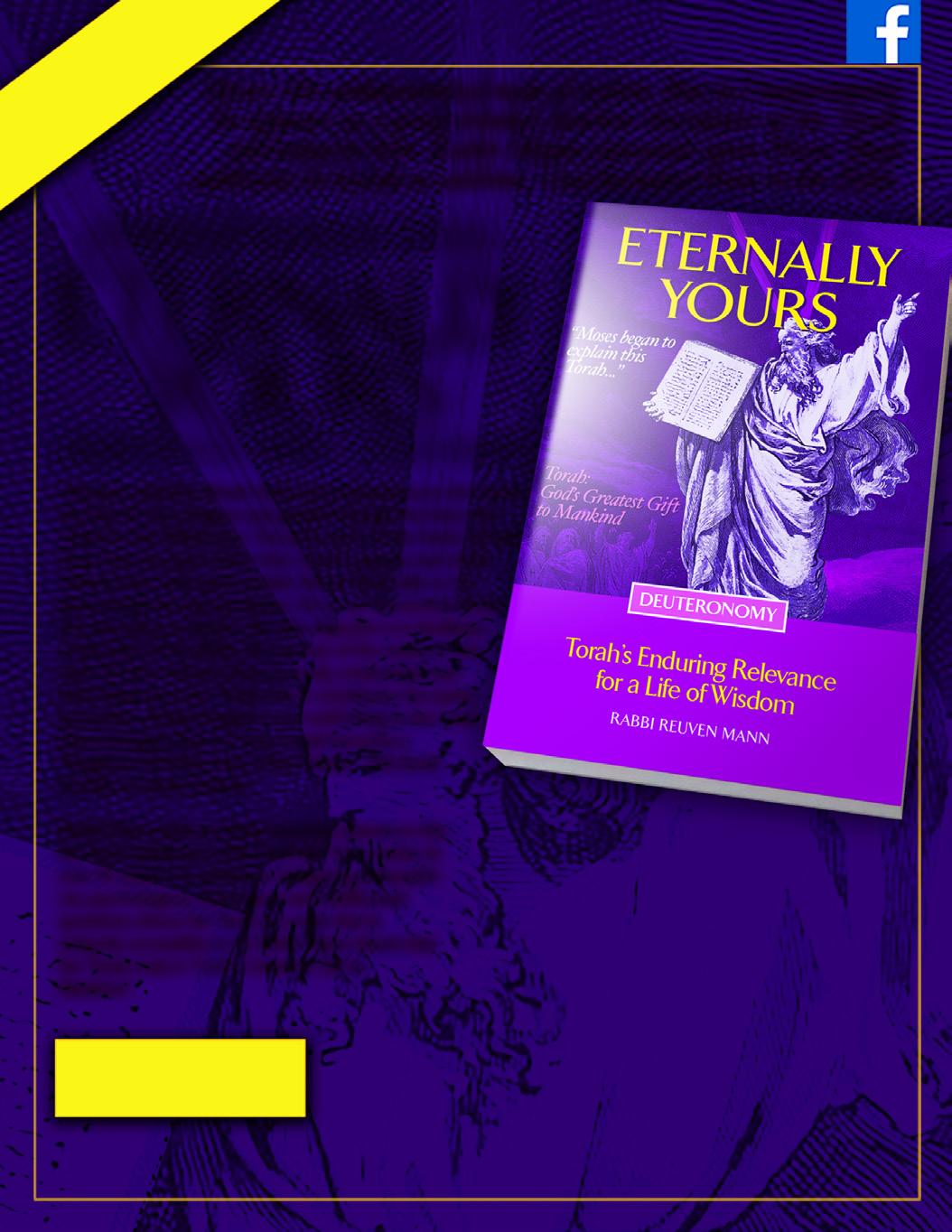












3 Make Man Di erent
STUDENTS
As God wants man to do only what’s right, why not create him where he can’t do anything wrong?
4 Earth Exists only for Torah
10 Atonement for Mitzvah?
Correcting our ideas about God

| “TALK TO YOURSELF?”
“Even if we are all wise, we must recite the Hagaddah. Even if we are alone, we must ask the 4 questions to ourselves.” (Maimonides)
We derive that Hagaddah is not a learning experience. It is a yearly transmission to all who wish to hear the Exodus story. It is not for the reciter, but the potential listener. Even if alone, we vocalize the questions to create the audible entity with the potential to transmit the Exodus. is command ensures the story never dies.
STUDENT Q&A

Why Not Make Man Di erent?
STUDENT: As God wants man to follow Torah without sinning, why doesn’t He just remove our instincts which is the cause of sin?




RABBI: I base my reply on Maimonides [1]. If man had no instincts, then he would be identical to angels and animals which have no free will. Therefore, we say that God desired there be a creature called man, who through conquering his instincts, can earn great reward by choosing between good and evil. If man was robotic like an angel, man would not be able to attain reward. Therefore God made man with the ability to follow either his instincts or his intellect and by choosing intellect, God bestows great reward on man that no other creature can achieve. Therefore this is a greater good than if man just did God's will without any free will, in that case, man would not have reward. So we can conclude that it is better that a being exists who can attain great reward.
[1] Guide, book III chap. xxxii ■

As Judaism is the only religion proved to originate from God [1], the rabbis’ authorized Torah explanations (Deut. 17:11) demand our greatest attention and loyalty. Avos 2:8 states as follows:
Rabban Yohanan ben Zakkai received [the oral tradition] from Hillel and Shammai. He used to say, “If you have learned much Torah, do not claim credit for yourself, because for this purpose were you created.”
Rashi comments:
For this purpose you entered into the air of the world (were you born), as it is
written, “And it was evening, and it was morning the Sixth Day.” This teaches that God made a condition with the works of creation: “If Israel does not accept Torah, the world will be returned to its primordial chaotic state.” This teaches that a great obligation rests upon you, and you do not perform Torah study for a gain (benefit). (Sabbath 88a)
“The Sixth Day” correlates to another sixth day: the sixth of Sivan when Torah was given. Creation correlates to Torah: Earth was created only for the purpose of Torah. And if Torah is not followed, the world will be retuned to its original chaotic state (Rashi, Avos 2:8).





For an honest person, our great rabbis’ lesson here must humble oneself; one should accept God’s will of a Torah life. One has no right to reject Torah, for this rejects God’s authority. One is also foolish to reject the life God says is the best life. You must accept your existence as a created, dependent and a tenuous thing, which is for the purpose of Torah. You did not always exist, nor will you always exist. But an eternal life awaits you, provided you follow God’s will. This doesn't mean our earthly life is less important, nor is it any less than blissful, when we follow God. In fact, it is only when one follows Torah fundamentals that one earns the afterlife [2]. This means the most enjoyable life leads to an eternal life o ering far greater satisfaction.
God designed our earthly life with amazing potential for happiness. But happiness is not natural, but must be studied and followed like anything other wise plan for success, as all is God’s creation, containing great wisdom.
What is the happy life? Happiness is achieved when we satisfy our most primary components. Just as we are physically and psychologically “happy” when we are not hungry, have no pain or illness, and when we have no stress…our more primary element—our souls—also need satisfaction. Without our minds engaged in that which pleases it, physical and psychological satisfaction alone will not yield happiness. God designed us precisely that happiness is attained through activities of the soul, of the mind. To most, this sounds strange as most believe the masses’ search for happiness through wealth, instinctual gratification and fame actually succeeds. But it should alarm you that many with wealth and fame are not happy. They say so. Jim Carrey said this about being rich: “I think everybody should get rich and famous and do everything they ever dreamed of so they can see that it's not the answer.” A study showed that of the 3 categories—poor, middle income and wealthy—the poor were unhappy as they lacked basic needs, the rich were unhappy as they experienced every pleasure and had nothing left to look forward to, but the middle income were the happiest, as they had their basic needs, and their dreams (Rabbi Israel Chait). There is much to be said about the anticipation of new experiences and new accomplishments. But even the middle
income were not fully happy…
This monetary gauge of happiness measured only marginal satisfaction. But when we consider the greatest Torah minds like Bais Hillel and Ibn Ezra who were quite poor, we look at their enjoyment in Torah study and discover that happiness is derived from daily involvement in God's wisdom. Despite lacking physical needs, one can achieve the greatest happiness through Torah. Pirkei Avos 6:4 says this too:
Such is the way [of a life] of Torah: you shall eat (only) bread with salt, and rationed water shall you drink; you shall sleep on the ground, your life will be one of privation, and in Torah shall you labor. If you do this, “Happy shall you be and it shall be good for you” (Psalms 128:2): “Happy shall you be” in this world, “and it shall be good for you” in the world to come.
Rabbi Israel Chait clarified a misinterpretation: this mishna does not encourage deprivation. Rabbi Yehuda the Prince was wealthy, as were the patriarchs and other rabbis. Rather, one dedicated to Torah out of love, is not deterred from Torah study, even when poor. This mishna describes the measure of one's attachment to Torah: it is not conditional on one's wealth, as the lover of Torah brilliance is undaunted by any other consideration, including poverty.
God designed man to be happy only when he pursues God’s wisdom. He commanded us in Torah so we are not left unguided, unhappy, and wasting our lives. We must feel so fortunate that we have God's direction and his Torah.
One must never feel it is too late to start Torah study, as Rabbi Akiva exemplified. Trust the great minds of the world, trust the great rabbis, who could not pull themselves away from Torah study due to its great enjoyment. Find a wise Rabbi and cling to him; minimize your work and maximize your Torah study, as we are so instructed (Avos 4:10). Dedicate your life to God’s Torah wisdom and you will attain the greatest happiness, and God will secure for you your needs [3]. ■
[1] https://www.mesora.org/god
[2] https://www.mesora.org/13principles.html
[3] Maimonides’ Mishna Torah: Shmita v’Yovale 13:13


CLUES IN THE TEXT REVEAL MYSTERIES

All books depict history, facts, theories, fiction or poetry. No book is coded with hidden messages beyond the words or patterns revealing marvels. But the Bible (Torah) was written by God, and is “coded.” The order of verses, use of certain phrases, apparent contradictions and other Biblical patterns are pur poseful clues to God’s wisdom.
This book unveils those patterns and shares the hidden messages.









his week’s Parsha, Tazriah, takes up issues concerning childbirth. This event confers a state of Tumah (ritual impurity) on the new mother and requires that after the passage of some time, she brings a burnt-offering and a sin-o ering on the Altar of the Temple. Many have puzzled over the necessity for the Chatat (sin-o ering) which is usually mandated when one has committed a serious Biblical prohibition. What sin has been committed by the woman who has endured the discomforts of pregnancy and the travails of childbirth in order to bring a new human into existence? Hasn’t this lady performed a great Mitzvah, and is she not deserving of a significant reward? But instead she must atone for sin?
The Rabbis explain that in the throes of labor, when the pain was excruciating, she cursed her husband and vowed not to resume marital relations with him. This, they aver, is the transgression for which atonement must now be made.
But there are obvious di culties with this explanation. Certainly, not every birthing mother utters curses nor makes these vows; and even if one did, it would not be binding since it was taken under extreme duress. Therefore, we cannot take the words of the Rabbis in their literal sense.




